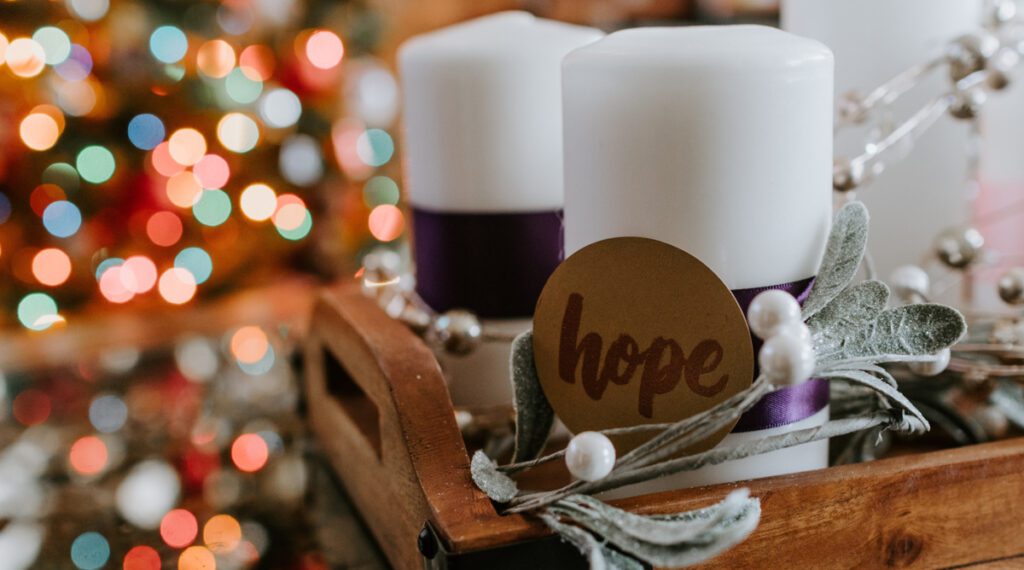Advent is a season of hope. During these darkest days of the year, we watch and wait.
In our human experience of suffering, we abide and keep a sober vigil. In moments of powerlessness, frustration, anguish, agony, or grief, we cry out for a redeemer and savior. We feel the depths of our emptiness and need, and we hope. We feel the ache acutely and cry out with heartfelt longing, Come, Lord Jesus!!
That’s the ideal, anyway. But let’s face it, hoarding can feel safer and easier than hoping.
At the mention of “hoarding,” we immediately visualize particular people, places, or things. I’m not talking about the medically diagnosable condition of hoarding. I am using the word in a broader, all-inclusive sense.
Most of us are hoarders in one way or another. It’s something we do to protect ourselves against feeling powerless, or against feeling grief. It gives us a sense of power. It props up the illusion of being in control.
Sometimes we hoard physical objects. We cling to what we no longer need; we clutter our living space. Throwing things away means feeling grief and loss. It is a death, and we don’t want to die. Keeping an open and inviting living space feels naked and vulnerable. We don’t like feeling powerless.
But we also hoard by cluttering our schedules with unnecessary commitments. We feel less like a failure because of the things we say “yes” to – even though we inwardly resent all the things we “have to” do. We avoid the pain of conflict and live with the clutter and chaos of too many commitments.
We hoard by only tackling the tasks we feel confident about, while repeatedly avoiding the ones that would risk failure or expose our weakness. We may even push those undesirable tasks onto others, shifting the blame onto them, or criticizing the failure of their valiant attempts.
We hoard when we hold onto comfort and ease, resisting needed changes. We want our churches to feel familiar to us, to be our own little nest. First-time visitors may feel uncertain, ashamed, or intimidated. We wouldn’t know, because we talk to the same familiar people, ignoring what others are needing or feeling.
We hoard when we suffer in silence rather than humbly reaching out for help and risking rejection. We cling to others, expecting them to meet our needs without actually asking. We do things for them in “service,” calculating that now they have to give us something in return. If I am entitled, then no one can reject me, right? In all these behaviors, we might even style ourselves a “martyr,” but the real martyrdom is happening in the people around us who have to put up with our behaviors!
We hoard with our addictive behaviors. We soothe ourselves with our screens, with our sugar, or perhaps even with impulsive cleaning and organizing – which may seem the opposite of hoarding. But it depends on why we are doing it. Is it a kindness to self and others, or is it avoiding and numbing what I don’t want to face or feel?
We hoard when we surround ourselves with busyness, noise, or talking. We resist silence and stillness. We cannot stand to slow down and actually feel our loneliness, our grief, or our anger. We would rather pretend they are not there.
But then how can we hope?
Every human heart holds the capacity to hope. As Augustine of Hippo said, “You have made us for yourself, O Lord, and our heart is restless until it rests in you.” Within each of us is an insatiable desire, an intense longing for the living God. But will we allow ourselves to feel it?
Hope can really hurt. To hope is to desire and not yet possess. That means that hope will include suffering. Hope will include grief. Hope will include vulnerability, even feeling powerless. We don’t like those experiences. And we hate to wait!
Thankfully, God is a good Father who delights in us as his children. He sees our struggles and loves us as we are. He knows our tendency to hoard; he gazes lovingly at us even as we repeatedly and relentlessly protect ourselves against him. We are so often like the dog hiding his head under the blanket. God smiles, and calls us by name.
Yet God honors our freedom. He desires us to desire him. He will not force or coerce. Like a lover, he pursues and woos us. He gently prods us, inviting us to admit how naked, blind, and miserable we actually are (cf. Revelation 3:14-20). We desperately need Jesus, but we do not like to feel the depths of our need.
Jesus’ coming brings true comfort, lasting peace, and abundant joy. Even in this world, he helps us to taste and see the goodness of the Lord. He blesses us with an abundance of love. Our hoarding hearts keep crying out, “It won’t be enough!!” and Jesus keeps assuring us, “My grace is enough for you; my power is made perfect in weakness” (2 Corinthians 12:9).
Will we surrender our supposed control? Will we set aside our pseudo-comforts? Will we allow ourselves to grieve and mourn? Will we remember that we have here no lasting city, that we are pilgrims passing through? Will we abide in hope?
Come, Lord Jesus!!
_________________________________________________________________________________________
This post was originally published on Abiding in Love and Truth and is reprinted here with permission.
Image courtesy of Unsplash.




